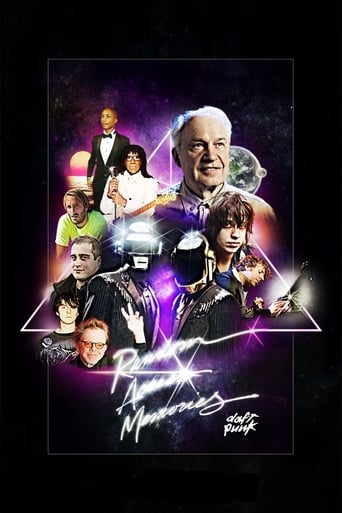
Giorgio Moroder
The first episode features disco pioneer Moroder speaking about his experiences with the genre such as his records with Donna Summer and experimenting with synthesizers. Moroder also talks about his visit with Daft Punk in their recording studio. When asked how he first found out about the duo, he replied that he first heard their 2000 single "One More Time" and especially liked the breakdown middle section. He concluded that he views Daft Punk as "perfectionists" and described the album's style as "something [...] different. Still dance, still electronic; but [they] give that human touch back".
Country:
Language:
Runtime: 70
Season 1:

The first episode features disco pioneer Moroder speaking about his experiences with the genre such as his records with Donna Summer and experimenting with synthesizers. Moroder also talks about his visit with Daft Punk in their recording studio. When asked how he first found out about the duo, he replied that he first heard their 2000 single "One More Time" and especially liked the breakdown middle section. He concluded that he views Daft Punk as "perfectionists" and described the album's style as "something [...] different. Still dance, still electronic; but [they] give that human touch back".

Episode two revealed that Edwards had contributed to the album; he expressed that it was difficult keeping his involvement a secret. Edwards had previously collaborated with Daft Punk to create the song "Face to Face" on the 2001 album Discovery. He summarized his experience in the studio recording "Fragments of Time" as being life-changing, as the sessions inspired him to move from New Jersey to California on a permanent basis. Edwards also pointed out the irony of "two androids [...] bringing soul back to music".

The third episode features Rodgers, who spoke of his background as a founding member of Chic, as well as his numerous collaborations with other artists throughout his career, such as David Bowie, Madonna, and Duran Duran. He expressed that working with Daft Punk "[felt] like [...] working with contemporaries" and that they motivated each other to excel when collaborating on the album. At the end of the episode, Rodgers played a portion of a then-unspecified song in which he participated, which was later identified as "Lose Yourself to Dance", and remarked that the duo's style has evolved whilst simultaneously exploring music's past, suggesting that "they went back to go forward."

Pharrell Williams participated in the fourth episode in which he elaborated on his experience with the creation of the album. Pharrell remarked upon the organic sound of the album, surmising that it "feels like the only click track they had was [...] the human heartbeat". He felt that the record can be enjoyed by people of all ages due to the accessible nature of music, and concluded that Daft Punk "could just get back on the spaceship that brought them here and go, and leave us. But they're gracious, they're nice robots. They chose to stay".

Episode five features Noah Lennox, better known by his stage name Panda Bear, who spoke about his contribution to the album as well as his history with the band Animal Collective. He had first heard of Daft Punk through the music video of the song "Around the World", which introduced him to many aspects of electronic dance music. He added that Homework was one of the few albums he and his older brother both enjoyed. Regarding Random Access Memories, Lennox remarked upon the approach of having live musicians, but structuring their performances in a minimal, sample-like fashion.

For the sixth episode, Gonzales spoke about his contribution to the album. He recalled Daft Punk's visible joy in listening to the raw session recordings made early in the production of the album, as well as the impending years-long challenge that would be faced in completing the record. Gonzales expressed that the duo were aware of how the keys of each song would contribute to the emotional progression of the album as a whole. He therefore performed the piano in the song "Within" to accommodate the cycle. Gonzales concluded by pointing out that Daft Punk rarely collaborate with others, and thus felt that they did so on Random Access Memories to "make the work be transcendent"

The seventh episode features Stéphane Quême, otherwise known as DJ Falcon, who spoke of first meeting Daft Punk when they began recording their debut album Homework. Quême noted that their sound had since changed and that each of their albums drew from different influences. He felt producers would be able to sample Random Access Memories in the same way Daft Punk had sampled older records in their previous albums.

Episode eight features Paul Williams, who likened Daft Punk's personas to a character from the film "Phantom of the Paradise", in which he starred. He also added that their masks hide who they are from the public and allow the listeners to enjoy the music for what it is. Paul Williams worked with the duo at Henson Recording Studios, the former studio of A&M Records where he had worked previously, including his compositions for Jim Henson's films featuring the Muppets, such as "Rainbow Connection". He also stated that the song he penned was to be sung from the point of view of an unidentified first person, setting the emotion, but the lyrics came from the music itself. Paul Williams said that he felt vulnerable while writing the record, and said he writes best when he is allowed to be honest and vulnerable, a situation that Daft Punk allowed.

